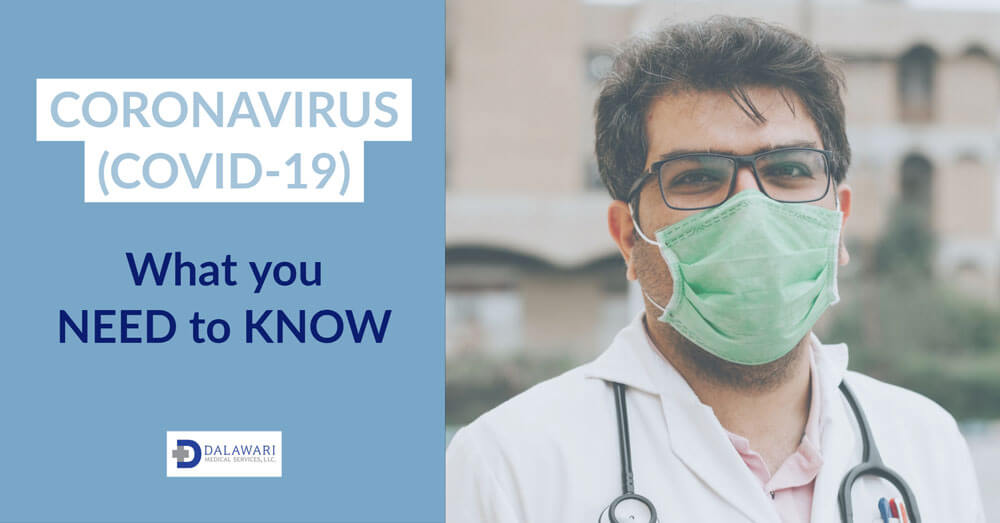Coronavirus (COVID-19): What you need to know!

What Is Coronavirus?
Coronavirus - The World Health Organization (WHO) recently issued a public health emergency (PHE) for the United States in response to the outbreak of a new group of viruses, coronavirus disease 2019.
The official name of this virus is coronavirus disease 2019 (COVID-19) or referred to as 2019-nCoV.
Additionally, within the last few years, the most recent outbreaks of coronavirus include SARS (severe acute respiratory syndrome) and MERS (Middle East respiratory syndrome).
However, the risk of contracting coronavirus in the United States is currently low due to the quick response from health authorities, while the risk is the highest in China.
How & Where Was Coronavirus First Discovered
First discovered in Wuhan, China, as a series of pneumonia cases of unknown cause and now detectable in 57 locations internationally. Coronaviruses are a large group of viruses that commonly affect different species of animals.
Early in the COVID-19 outbreak in China, a link showed transmission within a large seafood and live animal market that suggested animal-to-person spread.
Rarely, animal coronaviruses can spread to people but can now spread between people in close contact of an affected person, within 6 feet or through contact by infected respiratory droplets, such as coughing and sneezing.
The virus may also spread with indirect contact by touching a surface or object with the virus and transferring through the mouth, nose, or eyes.
What Symptoms Should You Look For?
Most people become infected with human coronaviruses during their lifetime but only experience mild to moderate upper-respiratory infections, such as the common cold during routine seasonal respiratory viral infections.
However, this new group of coronavirus, COVID-19, can cause severe respiratory illness in people, ranging from mild to severe.
Symptoms are usually milder than SARS and MERS but can include fever, cough, shortness of breath, and difficulty breathing that appear 2 to 14 days after exposure.
More severe cases may include pneumonia, severe SARS, kidney failure, and possible death.
Notify a healthcare professional if you develop signs and either traveled to or have been in contact with someone who has traveled to China within the last 14 days.
To limit spreading the virus, people suspected or diagnosed with coronavirus should restrict contact with others as well as animals and pets.
What Is the Incubation Period?
People are considered to not be infected if their last exposure has been more than 14 days. Coronavirus currently appears to affect the elderly and children the hardest, but few cases in children have been reported to major health organizations.
The CDC has implemented travel procedures in response to the new coronavirus. People who are not United States citizens who have visited China in the past 14 days may not enter the United States.
American citizens and lawful permanent residents who have been in China within the last 14 days can return to the United States, but they will be redirected to one of 11 approved airports for health screening and quarantine stations supervised by the CDC.
Depending on a person's health screening and travel history, temporary restrictions for 14 days from the time of leaving China and monitoring requirements will be enforced by health officials and the CDC.
Who Should Get Tested: How, where & when?
Healthcare professionals can test for the virus, but currently, there is no vaccine to prevent coronavirus and no specific antiviral treatment methods.
Healthcare professionals must employ enhanced standard precautions and control practices in hospitals. The FDA has approved a rapid test developed by the CDC to provide an accurate and fast diagnosis of the virus of patients with symptoms consistent with COVID-19.
The test is available at CDC-approved labs across the country and uses samples from the nose, throat, or lungs. Samples for the lab test can be acquired through a swab test, nasal or tracheal aspirate, sputum test, or blood.
In areas where the rapid test is not available, laboratories have the authorization to speed up obtaining test results for susceptible patients while maintaining strict protocols to minimize spreading the virus.
What Can You Do Today to Prevent Transmission?
Standard recommendations to prevent transmission include regular hand washing, covering the mouth and nose when coughing or sneezing, and thoroughly cooking meat and eggs.
Avoiding exposure is the only method in the prevention, and the only available treatment consists of recommended supportive care to help relieve symptoms, such as drinking fluids, resting, and taking over-the-counter pain relievers.
Since the United States is currently a low-risk region for the coronavirus, early tactics to reduce the spread of the virus, such as canceling of public events or wearing a mask, unless in a healthcare setting, are not currently required.
People who have traveled or have been in contact with someone who went to China within the last 14 days should take the highest precautions and need the guidance of a healthcare professional.
References
- Centers for Disease Control and Prevention (CDC). (2020, February 28). COVID-19 Situation Summary. Retrieved from https://www.cdc.gov/coronavirus/2019-nCoV/summary.html
- Centers for Disease Control and Prevention (CDC). (2020, February 28). How it Spreads. Retrieved from https://www.cdc.gov/coronavirus/2019-ncov/about/transmission.html
- Centers for Disease Control and Prevention (CDC). (2020, February 15). Prevention & Treatment. Retrieved from https://www.cdc.gov/coronavirus/2019-ncov/about/prevention-treatment.html
- Centers for Disease Control and Prevention (CDC). (2020, February 15). Symptoms. Retrieved from https://www.cdc.gov/coronavirus/2019-ncov/about/symptoms.html
- Commonwealth of Massachusetts. (2020, February 28, 2020). Information on the Outbreak of 2019 Novel Coronavirus (COVID-19). Retrieved from https://www.mass.gov/guides/information-on-the-outbreak-of-2019-novel-coronavirus-covid-19
- Medline Plus. (2020, February 19). Coronavirus Testing. Retrieved from https://medlineplus.gov/lab-tests/coronavirus-testing/
- World Health Organization (WHO). Coronavirus. (n.d.). Retrieved from https://www.who.int/health-topics/coronavirus
Do you have questions about a medical case or need help understanding treatment plans and options?
Health & Patient Advocacy | Medical Case Review
Medical Expert Witness
Dalawari Medical Services - Medical Consulting
Click here to Contact Us via email or Call + (804)-991-4109




Dr. Dalawari,
Commend you for taking the time and interest to provide this helpful information. Have a wonderful day.